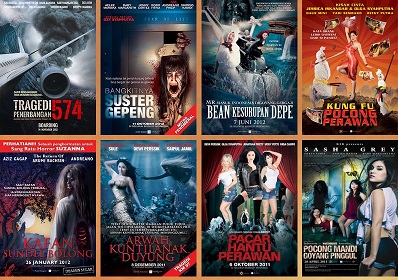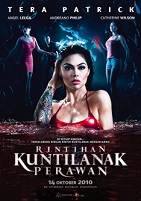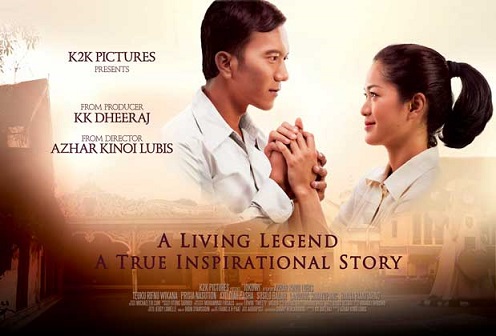KK Dheeraj’s unauthorised biopic is full of tears and belaboured symbolism
Helen Pausacker
Since Joko Widodo (Jokowi) emerged as a leading contender for the presidency just over a year ago, the Indonesian public has shown an interest in his early life. The film Jokowi, subtitled in English ‘A living legend – A true inspirational story’, was released in June 2013, just as the popularity of the then Governor of Jakarta was spreading. The biopic follows both his autobiography and a number of biographies. Biopics of prominent religious and political figures are increasingly popular in Indonesia, promoting largely nationalist narratives. They have also played a role in present-day political campaigns.
The biopic in Indonesian contemporary cinema
Two recent films in this genre feature historical figures, both religious officials, and are set against the background of the Independence struggle. Sang Kiai (2013, directed by Rako Prijanto) portrays the life of KH Hasyim Asy’ari, the founder of Nahdlatul Ulama and grandfather of Abdurrahman Wahid (Gus Dur). Soegijo (2012, directed by Garin Nugroho) is about the life of Albertus Magnus Soegijapranata, a national hero and the first indigenous Catholic Archbishop in Indonesia. The film was produced by Puskat, a Jesuit studio based in Yogyakarta.
A number of other films in this genre portray politicians who are still living. Sepatu Dahlan (Dahlan’s Shoes, 2014, directed by Benni Setiawan) is a biopic of Minister of State-Owned Enterprises, Dahlan Iskan, the former CEO of the newspaper group, Jawa Pos. The film was produced by Islamic book publisher Mizan and is based on a novel of the same name by Khrisna Pabichara. Both depict the early, impoverished life of Dahlan Iskan in Magetan, Central Java, in the 1950s, when his main desires were to own a pair of shoes and a bicycle.
Habibie & Ainun (2012, directed by Faozan Rizal) shows the romance between Indonesia’s third president, Bacharuddin Habibie and his wife. Habibie was involved in the making of the film as an advisor and joined in its promotion, being photographed with the two stars against the background of the film poster.
In contrast, Jokowi had no involvement with his biopic, perhaps wishing to steer clear of association with its controversial producer.
Director and producer
Jokowi is director Azhar Kinoi Lubis’ first feature film. Born in 1980, he graduated from the Jakarta Institute of Arts in 2003. Lubis has worked as assistant director on a number of films and television programs with well-known directors, including Garin Nugroho. He also directed nine independent short films including Peron (Platform), an omnibus film with nine other directors.

The producer of Jokowi, KK Dheeraj, founded K2K Productions in 2006 and is no stranger to controversy. Dheeraj was born in Indonesia to parents of Indian descent and is best known for his B-grade horror films and ‘romantic’ (sexy) comedies. Dheeraj has courted controversy, and possibly increased audience numbers, by using western porn stars in his films.
Rintihan Kuntilanak Perawan (Moaning of a Virgin Ghost) portrays Indonesian rock musicians abducting a virgin, Alice, and drinking her blood to improve their fortunes. Alice is played by American porn star Tera Patrick, who does not appear naked but wears a bikini to avoid censorship. The same approach is taken in another of Dheeraj’s films, Pocong Mandi Goyang Pinggul (Shrouded Corpse Shaking her Hips Bathing) in which Sasha Grey, another American porn star, plays a bikini-clad ghost.
Islamic extremist group FPI (Islamic Defenders Front) objected to the release of Rintihan and threatened violent protests if Grey came to Indonesia to promote the film. Dheeraj responded by screening the film at FPI headquarters to demonstrate that even though it featured a porn star actress, Rintihan was not porn.

Unlike Grey, the star of another of Dheeraj’s films in this genre, Pacar Hantu Perawan (Virgin Ghost’s Lover), was unwilling to come to Indonesia. Vicky Vette became embroiled in a controversial and bizarre taunting of the then Minister of Communications, Titaful Sembiring, from the Islamic party, PKS, after he shook Michelle Obama’s hand. Titaful had previously stated he would not touch a woman who was not a relative. Vette tweeted, ‘You can touch me in public anytime you want, cutie!’ Nervous that she might not receive a warm reception in Indonesia following her tweet, Vette shot her scenes for Pacar Hantu Perawan overseas.
In 2012, another of Dheeraj’s films became involved in controversy over a different type of western actor. The promotional poster for his comedy-horror film, Mr Bean Kesurupan Depe (Mr Bean Possessed by Depe) featured ‘Mr Bean’ wearing a white pocong (death shroud). However Mr Bean was not played by Rowan Atkinson, the actor who had made the character internationally famous, but by William Ferguson. Muhammad Ruditjo, a Jakarta-based lawyer, filed a report with Bogor Police accusing Dheeraj of fraud. Dheeraj stated that he had only advertised that the film starred ‘Mr Bean from England’. ‘Mr Bean’, he asserted, was a reference to a fictional character not Atkinson and Ferguson was indeed from England.
With his thirtieth film, Dheeraj chose to embark on an entirely new genre - the biopic. While he has described Jokowi as a tribute to the president-elect, , he was also presumably hoping to cash in on Jokowi’s popularity. However the film was not a commercial success and portrays the early events of Jokowi’s life with a focus on the downs rather than the ups, in classic sinetron (soapie) style.
Telling the story: trials rather than tribulations
In Jokowi, one disaster follows another. The film opens with a scene in which Jokowi’s father, Notomihardjo, is stopped by the military on his way to visit his wife in hospital where she has just given birth to Jokowi. In an attempt to pay rent on their house, Notomihardjo takes family crockery to sell, but on the way has a bike accident and the plates are broken. Forced out of their house with the infant Jokowi, we see the couple sitting in the rain, sharing a plate of food at a warung (roadside stall), where they are offered a small house to rent. Later, they flee this house after the owner, Suroso, is taken for questioning by the military in the post-1965 round-up of suspected communists. The family subsequently finds a new place, only to be turned out again when their neighbourhood is flattened to make way for a bus terminal.
It is indeed interesting that a brief scene depicting the persecution of suspected communist sympathisers was included in the film – perhaps a sign of changing attitudes toward the post-1965 events. The victims are portrayed sympathetically, albeit with acting so wooden that it is hard to believe anything serious is happening.
Amongst the traumas, there are brief scenes depicting Jokowi’s scholastic achievements. In primary school, we see the teacher commenting that he always gets 100 per cent for his work and Jokowi is applauded by his fellow students. The scene is repeated during secondary school, where he also achieves good results.
The second half of the film depicts Jokowi’s courtship of Iriana, his wife-to-be. Here, Jokowi is shown to be a bit clumsy and tongue-tied, in a way intended to be endearing. On his way to declare his love for Iriana, he is knocked off his bike. But Iriana is undeterred. She is drawn to his good character, preferring him to her other, richer suitor, the motorbike rider Mas Handoko, who refuses even to shake Jokowi’s hand. The film then jumps from Jokowi’s ambiguous proposal, to the kitchen where the couple, now married, already have a baby.
Having honed in on small episodes from Jokowi’s childhood in great detail early in the film, the rendering of his adult life moves at a more rapid pace. It pauses only briefly to depict the first financial disaster in his furniture business and a French customer nicknaming him ‘Jokowi’ for the first time.
The film seems undecided about how to end. A good Indonesian tear-jerker should end in tragedy, with at least one of the main characters dying. Just prior to Jokowi’s first financial business disaster we are shown the funeral of his grandfather and the final personal scene is of Jokowi’s father’s funeral, at which the family cries around the grave. Jokowi stays behind alone, places his father’s watch on the grave and promises he will look after his mother. In the film, after depictions of the deaths of both his grandfather and father, we are offered flashbacks to scenes of Jokowi’s childhood and their influence on him.
However the final scene is a type of epilogue. It shows a market place in Solo, where vendors are watching the television as Jokowi becomes governor of Jakarta. Just as his classmates did when he was young, everyone applauds.
Rock-and-roll, but no sex or drugs
In stark contrast to KK Dheeraj’s other films, there is no sauciness in this film. The young Jokowi does nothing wrong – he does not cheat, lie, smoke, drink or engage in youthful sexual experimentation. The few times he is in trouble with his parents are the result of misunderstandings.
In the first incident, Notomihardjo blames himself because he thinks Jokowi has willingly been involved in a fight. In fact, Jokowi was beaten up for refusing a bribe from a boy who absconded from Islamic studies. Then when Jokowi’s interest in Metallica reduces his mother to sobbing on her prayer mat, he takes her hands and explains that his interest in rock music has not led him astray. In another scene, we see him on his way to buy a music cassette, but he instead gives half the money to an old woman beggar.
The film plays its symbolism and an attempt to paint a heavy-handed psychological portrait. The camera sweeps in on small details to ram home the point to the viewer. For example, when Jokowi’s family seeks refuge after 1965, Jokowi enters the house and the camera pans in on a crucifix. The older girl in the house explains to him that this is the Catholic symbol of Jesus – placing the origins of Jokowi’s religious tolerance deep in his childhood (his running mates in Solo and Jakarta were both Christians).
We see a number of scenes of a young Jokowi fishing to help feed his family. Indeed he has the fish with him when the military knock down their house. The camera focuses on a fish being trodden on by a military boot. Little Jokowi weeps – as he does often in the early part of the film.
Notomihardjo’s watch also serves as a leitmotif to bind the beginning and end of the film together. Early on we see his father pawning his watch for rental money. Later when the family is better off, adult Jokowi is invited by the pawnbroker’s son to retrieve the watch. As Jokowi takes the watch, he receives a call that his own father has just died. The camera closely follows the watch falling from Jokowi’s hand to the floor. Jokowi’s father’s time is up. Surprisingly the watch does not smash, as might have been expected from the clash of cymbals in the mood music accompanying the image.
The adults in the film spend much time philosophising to the young Jokowi, giving him some heavy-handed lessons for his later life in public service. His grandfather brings out the ubiquitous wayang puppets, explaining that Semar is both a servant and also a god, and that Wrekudara (Bima) is tough with his son, Gathutkaca, because he loves him.
When Jokowi is upset because he can’t go to the best high school and has to go to a second-rate school, his father says that whether a shirt looks good or bad depends on the wearer. Later, before Jokowi leaves for university, his father takes him to a soup stall and explains that the seller has to serve the community and try to meet many different requests. This, his father explains, Jokowi must also do later in life.
Against this saintliness, Jokowi is shown to have a burning desire to make money and for the family to rise from its status. He cries with grief when the family has to move in with others, and pressures his father to build their own (surprisingly large) house. He cries again (with relief, this time) when they finally have their own house.
Two presidential candidates, two films
The 2014 presidential election was the first in which there were recently-released cinematic representations of both candidates. The only similarity between the two films was that neither captured the public imagination.
The films were as different as the candidates themselves. Sang Patriot (2014, director Helmi Adam), sponsored and produced by Prabowo Subianto’s party and released on its YouTube channel, was a documentary portraying Prabowo as a strong and powerful man from a family with a long political heritage. The film is rather grandiose and highlights his successes.
By contrast, Jokowi did not give permission for Jokowi, the film, to be made and has, perhaps wisely, distanced himself from the production rather than becoming embroiled in fights with its controversial producer. He did not attend the premiere of his biopic.
Jokowi is made in the sinetron style focusing on emotions and life’s disasters. Nevertheless, it does truthfully follow the broad outline of Joko Widodo’s early life. What it lacks in subtlety it makes up for in the obvious admiration shown by the producer and director for their subject, an admiration shared by many Indonesians. The film may not have enhanced, but neither has it damaged, Jokowi’s reputation. Jokowi, the man, achieved success through the ballot box, even if the film of his life flopped at the box office.
Helen Pausacker (h.pausacker@unimelb.edu.au) is Deputy Director and principal research assistant in the Centre for Indonesian Law, Islam and Society, University of Melbourne.
Other related articles from the II archive:
'Jokowi: Rise of a polite populist', Marcus Mietzner
'Jokowi for President? No!', Roanne van Voorst
Inside Indonesia 117: Jul-Sep 2014
{jcomments on}












